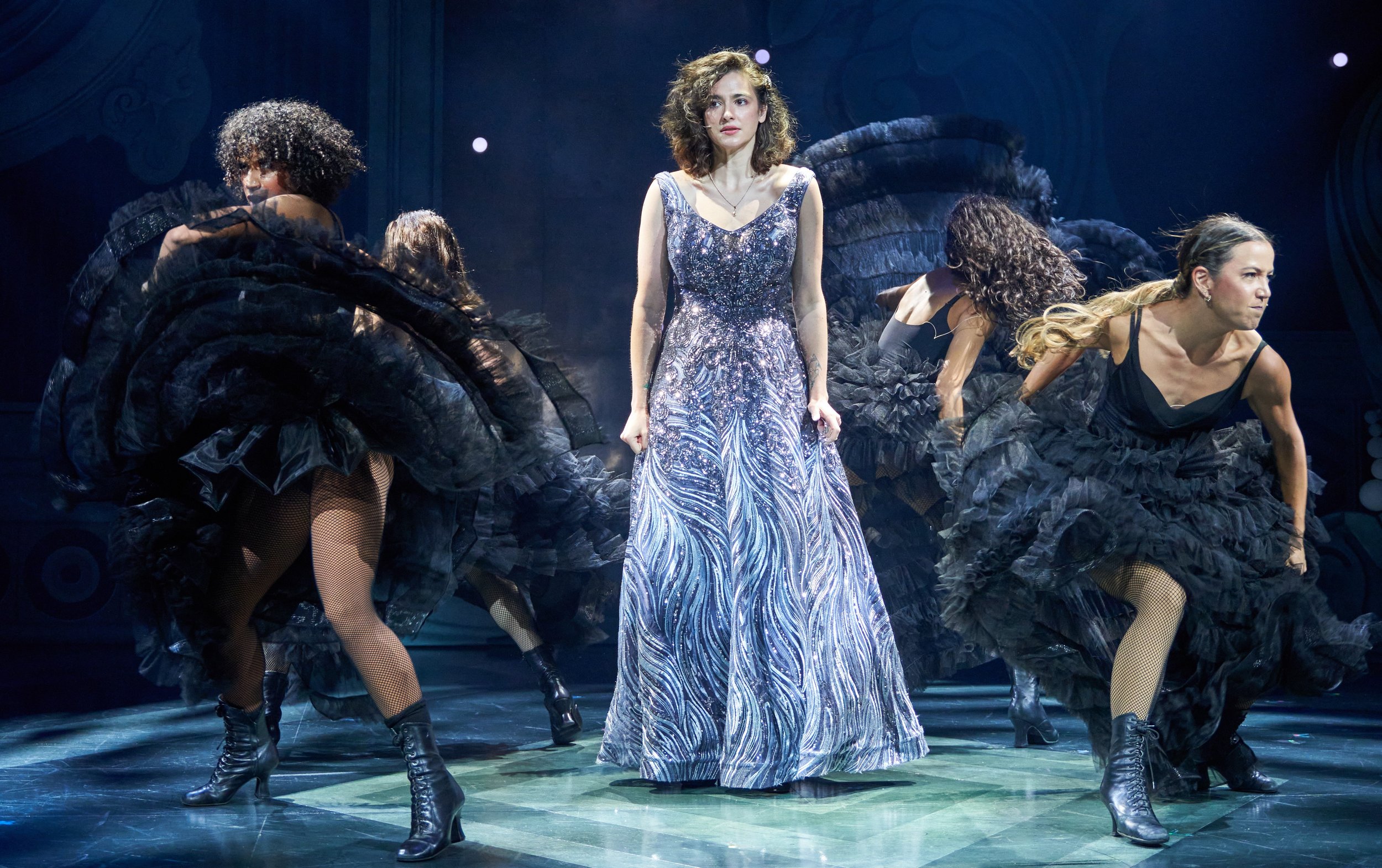Cosimo’s royal family (from left): Karine Plantadit as Queen Roksana, Terrence Mann as King Belenus and Gaby Diaz as Princess Tooba.
A cast of 20. An original story, not based on a book or movie. Plenty of dancing. Few modern musicals have all these things, and that Only Gold does indicates the breadth of its ambition. Set in Paris in 1928, the show features an ensemble in near-constant motion on an art deco–styled stage with a long, winding staircase whose banister extends into a circular fixture suspended above the stage amid a sky of globular lights. In design and concept it’s a very ambitious project indeed.
Or maybe it wasn’t ambitious enough, because despite the glamorous set and costumes and a cast of fan favorites from theater, TV and music, Only Gold lacks an essential component: a cohesive story of any consequence.
The ensemble dances around Camille (Hannah Cruz, center). Photographs by Daniel J. Vasquez.
Produced by MCC Theater, Only Gold marks the directorial debut of Tony-winning choreographer Andy Blankenbuehler, who cowrote the book with Ted Malawer, a writer on the recent Halston miniseries. Music and lyrics are by singer-songwriter Kate Nash, an indie-pop star in her native Britain. The creative team also includes scenic designer David Korins and lighting designer Jeff Croiter, while the cast is headed by Tony nominees Terrence Mann and Karine Plantadit, So You Think You Can Dance champ Gaby Diaz, longtime ensemble standout Ryan Steele and Suffs’ Hannah Cruz.
That’s a lot of well-respected artists contributing to the production. And they shine in expected ways: Mann with his commanding presence and baritone, Plantadit’s sinuous movement and exotic allure, Diaz and Steele partnering delightfully. All these talents basically serve as window dressing, though, in the absence of earned emotionality or sound plotting. Characters abruptly change their feelings without much motivation, as when a woman who’s been miserable tells her husband, “I can’t do this anymore, I’m done,” then reconciles with him moments later. The strain in another marriage, barely hinted at during the first act, turns out to be a focal point of Act II.
Mann and Plantadit play Belenus and Roksana, the king and queen of Cosimo, who have come to Paris to arrange the betrothal of their daughter, Tooba (Diaz), to a count. The rebellious princess falls for a sensitive bellhop, Jacques (Steele), instead. A third couple in the tale are a watchmaker named Henri (Ryan VanDenBoom) and his wife, Camille (Cruz), a pianist. King Belenus pays them a visit in search of a necklace for Roksana like the one he purchased at Henri’s shop years ago—back when it was run by Henri’s father, a jeweler. The king requests a new necklace be made, et voilà! Henri can finally become an artist rather than just a tradesman. Camille remains frustrated in her career, because symphony orchestras won’t hire women musicians.
Diaz duets with Ryan Steele as the princess’s forbidden love interest, Jacques.
The script takes some shortcuts that preclude satisfactory story development: “Responsibilities and expectations weighed them down” is the vague explanation why Roksana became so deeply unhappy in her marriage, for instance. It’s not particularly enhanced, either, by Nash’s score. Occasionally the lyrics even misalign with the goings-on: After Act I ends with Tooba and her mother aghast that the King still insists on Tooba’s engagement to the Count, the second act’s opening song begins, “All I know is that you’re so nice / You’re the nicest thing I’ve seen.”
The ensemble is used to represent characters’ inner turmoil, but it’s not always clear what they’re “saying” through dance. Skillful though they may be, the dancers seem superfluous in some of these scenes where they’re on stage for interpretive purposes rather than to portray characters.
An onstage presence that’s not necessary at all is the narrator, played by Nash. She isn’t integrated into the action, and her commentary consists of either background that could be conveyed by characters’ dialogue and behavior or bromidic insights like this scene-setter: “A time when rules were ready to be broken. A place where a cup of coffee, a night at the opera or a simple necklace from an alley shop could change your entire life”—something that could be said about many places and times besides 1928 Paris. Ditto the later comment: “If you’re gonna try to listen to that voice deep inside you, this is the place to do it. Here, there is magic in the cobblestones, the water, the wine.”
While this narration, like the plot in general, is short on substance, the production does not want for ambience. Between the ensemble’s formidable effort, Anita Yavich’s vivid costuming (gowns worn by Diaz and Cruz and Mann’s gold-patterned suit are especially memorable) and the overall spectacle, Only Gold feels very complete even with the holes in its script.
Only Gold runs through Nov. 27 at the Robert W. Wilson MCC Theater Space (511 W. 52nd St.). Performances are 7 p.m. Tuesday and Wednesday; 8 p.m. Thursday through Saturday; 2 p.m. Thursday, Saturday and Sunday. Visit mcctheater.org.





